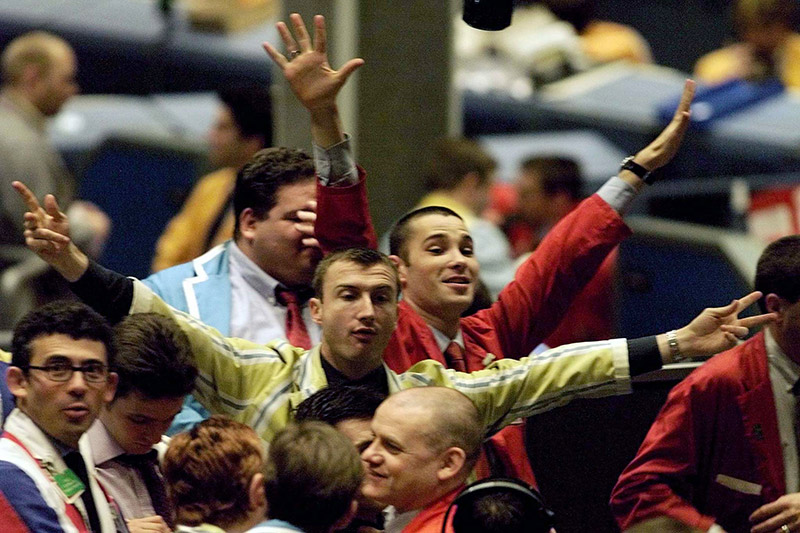Investing.com - European stock markets were sharply lower on Thursday, as sentiment was hit after downbeat euro zone manufacturing and service sector data and after a report showed that Chinese manufacturing activity contracted for a fifth consecutive month.
During European morning trade, the EURO STOXX 50 plummeted 1.60%, France’s CAC 40 tumbled 1.69%, while Germany’s DAX 30 declined 1.62%.
Markit said that its preliminary euro zone manufacturing purchasing managers’ index declined to 47.7 in March from a final reading of 49.0 the previous month, disappointing expectations for a rise to 49.6.
The report also indicated that the services purchasing managers’ index declined to 48.7 from 48.8 in February. Analysts had expected the services PMI to rise to 49.3 in March.
Meanwhile, sentiment was also hit after preliminary data from HSBC showed that China’s manufacturing purchasing managers’ index fell to 48.1 in March, from a final reading of 49.6 the previous month, as new orders dropped to their lowest level since November.
German industrial group ThyssenKrupp led losses with shares plunging 2.69%, closely followed by chemical and pharmaceutical company Bayer AG, tumbling 2.57%.
Earlier in the day, data showed that manufacturing activity in Germany slowed to the lowest level in four months in March, while the services sector also hit a four-month low.
Financial stocks were also sharply lower, as shares in German lenders Deutsche Bank and Commerzbank plunged 2.58% and 2.42% respectively, while France’s Societe Generale and BNP Paribas plummeted 3.27% and 2%.
Meanwhile, Switzerland’s third largest insurer, Baloise saw shares sink 4.44% after saying profit dropped 86% last year on investment losses and a writedown on Greek sovereign debt.
On the upside, Hermes advanced 1.97% after the company posted earnings that beat analyst estimates and offered a bonus dividend to shareholders.
In London, commodity-heavy FTSE 100 declined 0.97%, weighed by sharp losses in mining stocks, while data showed that showed that U.K. retail sales fell more-than-expected in February.
Copper producers Xstrata and Kazakhmys sank 3.90% and 3.27%, while mining giants Rio Tinto and Bhp Billiton saw shares drop 3.54% and 3.02% respectively.
Amec Plc lost 2.80% after JPMorgan Chase reduced its recommendation on the oil and gas engineering company to neutral from overweight.
Meanwhile, Kingfisher retailing company dropped 1.07% after the company said retail conditions in its home U.K. market remain “challenging,” even as it posted net income that beat estimates.
Elsewhere, U.K. lenders tracked their European counterparts sharply lower. Shares in the Royal Bank of Scotland plunged 3.33% and Barclays tumbled 3.13%, while Lloyds banking and HSBC Holdings declined 2.36% and 1%.
In the U.S., equity markets pointed to a lower open. The Dow Jones Industrial Average futures pointed to a fall of 0.19%, S&P 500 futures signaled a 0.96% decline, while the Nasdaq 100 futures indicated a 0.35% loss.
Later in the day, the euro zone was to release official data on industrial orders, while the U.S. was to publish official data on initial jobless claims.
In addition, European Central Bank President Mario Draghi and Federal Reserve Chairman Ben Bernanke were to speak at public engagements.
During European morning trade, the EURO STOXX 50 plummeted 1.60%, France’s CAC 40 tumbled 1.69%, while Germany’s DAX 30 declined 1.62%.
Markit said that its preliminary euro zone manufacturing purchasing managers’ index declined to 47.7 in March from a final reading of 49.0 the previous month, disappointing expectations for a rise to 49.6.
The report also indicated that the services purchasing managers’ index declined to 48.7 from 48.8 in February. Analysts had expected the services PMI to rise to 49.3 in March.
Meanwhile, sentiment was also hit after preliminary data from HSBC showed that China’s manufacturing purchasing managers’ index fell to 48.1 in March, from a final reading of 49.6 the previous month, as new orders dropped to their lowest level since November.
German industrial group ThyssenKrupp led losses with shares plunging 2.69%, closely followed by chemical and pharmaceutical company Bayer AG, tumbling 2.57%.
Earlier in the day, data showed that manufacturing activity in Germany slowed to the lowest level in four months in March, while the services sector also hit a four-month low.
Financial stocks were also sharply lower, as shares in German lenders Deutsche Bank and Commerzbank plunged 2.58% and 2.42% respectively, while France’s Societe Generale and BNP Paribas plummeted 3.27% and 2%.
Meanwhile, Switzerland’s third largest insurer, Baloise saw shares sink 4.44% after saying profit dropped 86% last year on investment losses and a writedown on Greek sovereign debt.
On the upside, Hermes advanced 1.97% after the company posted earnings that beat analyst estimates and offered a bonus dividend to shareholders.
In London, commodity-heavy FTSE 100 declined 0.97%, weighed by sharp losses in mining stocks, while data showed that showed that U.K. retail sales fell more-than-expected in February.
Copper producers Xstrata and Kazakhmys sank 3.90% and 3.27%, while mining giants Rio Tinto and Bhp Billiton saw shares drop 3.54% and 3.02% respectively.
Amec Plc lost 2.80% after JPMorgan Chase reduced its recommendation on the oil and gas engineering company to neutral from overweight.
Meanwhile, Kingfisher retailing company dropped 1.07% after the company said retail conditions in its home U.K. market remain “challenging,” even as it posted net income that beat estimates.
Elsewhere, U.K. lenders tracked their European counterparts sharply lower. Shares in the Royal Bank of Scotland plunged 3.33% and Barclays tumbled 3.13%, while Lloyds banking and HSBC Holdings declined 2.36% and 1%.
In the U.S., equity markets pointed to a lower open. The Dow Jones Industrial Average futures pointed to a fall of 0.19%, S&P 500 futures signaled a 0.96% decline, while the Nasdaq 100 futures indicated a 0.35% loss.
Later in the day, the euro zone was to release official data on industrial orders, while the U.S. was to publish official data on initial jobless claims.
In addition, European Central Bank President Mario Draghi and Federal Reserve Chairman Ben Bernanke were to speak at public engagements.
